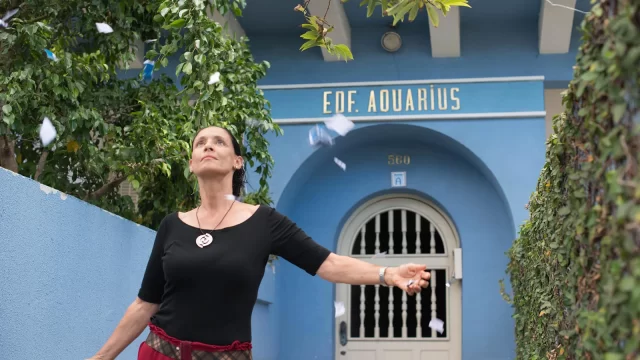
The post Monday Movie: Aquarius, by Scott Nye appeared first on Battleship Pretension.
Every Monday, we’ll highlight a piece of writing from our vaults. This review of Aquarius originally ran as a theatrical review.
Do objects have a history? Can the past be preserved through things? Early on in Kleber Mendonça Filho’s Aquarius, acclaimed music writer Clara (Sônia Braga) tells a young journalist about a record she picked up at a local shop, into which is inserted a Los Angeles newspaper clipping about John Lennon days before he was murdered. This record made its way from California to Brazil, along with a vital piece of literature forgotten by its previous owner and unnoticed by the shop that carried it. Is that a history? Does that explain the importance of physical media? Or is it a bureau that sits in Clara’s apartment, on which her aunt recalls passionately making love? Is it her hair, which she once lost in chemotherapy and now wears long, shaking it wildly each morning in appreciation? To what extent are objects and physical traits merely comforting, or are they essential?
Clara may have accepted digital music, but she stands resolute in her apartment, unwilling to sell to a construction company looking to tear down the building and replace it with something more modern. She’s the only resident left. She wanders the halls looking in where her neighbors once were. The company is polite at first, increasing their offers and terms to try to find something she might accept. But over the course of this 140-minute film, their methods will grow more insistent. Their leverage is considerable – besides the political power that comes with their financial success, they own the rest of the building and can find innumerable ways to make life uncomfortable for her.
Filho films their intrusions in the manner of a thriller, situating us in a limited point-of-view that heightens intrusions to the frame or sound design without fully explicating them. Groups of people come and go, ladders are put up, mattresses are moved in; to what end? Like Clara, we’re left on the defensive. But she’s a fighter. She beat cancer, and has lived on her own for nearly twenty years since her husband’s passing. She yearns for companionship, but has learned to make do without as men flee when they learn of her mastectomy. Any pressure to sell her apartment, be it from strangers or her own children, only furthers her resolve to stay.
In all interactions, the baseline assumption is that Clara cannot fend for herself in a fairly-large Brazilian city. The building hardly has the latest security features, and after all she is alone. Her children fear for her safety. The company preys on those fears. Her housekeeper Ladjane (Zoraide Coleto) often acts as lookout. Filho’s approach to this is not to show Clara overcome some obvious danger, but use these threats to underscore her somewhat aggressive attitude. It’s extremely rare to see her completely at ease around other people. When she arrives home, she seems to exhale. She plays a role, or a series of roles, defending against indistinguishable and undefinable expectations. Braga has a way of looking slightly past or through the people in front of her, a maneuver that allows Clara to not break her gaze without opening herself up to doubt. Her reactions are a perpetual sigh, an acknowledgment that most people live up to your expectations, often for the worse.
Right or not, though, where do those expectations get her? Do they in some way encourage the negative behavior she anticipates? She’s especially critical of her daughter (Maeve Jinkings), who’s positively flailing and desperate to connect with a mother who offers little in the way of comfort or support. She acts friendly towards Ladjane, but takes no interest in her personal life. In a brief encounter on the street, the son of one of her former neighbors says she’s selfish to remain in the building, suggesting the project’s stasis is holding up some money owed his father. Through it all, this push and pull continues. The belief in a home as a physical space in which one can feel comfortable and safe, is a near-universal value. But there’s a certain line at which the space becomes more important than the people who fill it, and Clara may have already crossed it.
By the time the construction company’s threats truly cross the line, the die is cast, and all Clara can do is launch one final protest. The physical space she holds so dear becomes a weapon against her, and against the company. Filho’s emphasis on the way light plays in the rooms, the way footsteps sound in the hallway and through the floorboards, all comes to bear in the climax. If her history is tied to the building, and the building will be swallowed, all she can do is pull them down with her.
The post Monday Movie: Aquarius, by Scott Nye first appeared on Battleship Pretension.
The post Monday Movie: Aquarius, by Scott Nye appeared first on Battleship Pretension.




